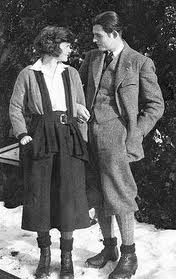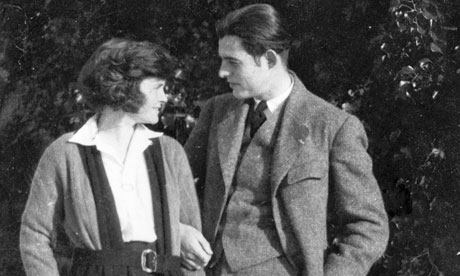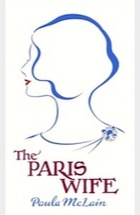 |
| Hadley and Ernest, 1922 |
The Paris Wife by Paula McLain – review
Paula McLain's novel gives Ernest Hemingway's Paris years an affectingly romantic cast

Hadley and Ernest Hemingway in Chamby, Switzerland, 1922. Photograph: Ernest Hemingway Photograph Collection, John F. Kennedy Presidential Library and Museum, Boston.
A few years back, the novelist Curtis Sittenfeld had the bright idea of fictionalising the life of Laura Bush. American Wife told the story of one Alice Blackwell, the gentle, liberal first lady of a wealthy, vulgar and dim-witted president. It was a clever sidelong way of peeking into the Bush administration, and prefigured both the name and modus operandi ofThe Paris Wife, a novelisation of Ernest Hemingway's first marriage from the point of view of his quiet and good-tempered spouse.
Like George Bush, Hemingway has over the years degenerated into a crude caricature of himself: "Papa", the drink-sodden bully who roamed the world with a shotgun in one hand and a whiskey in the other. By returning to the heady Paris interlude that began his career, Paula McLain retrieves a more appealing figure: a suitable romantic hero, in fact, for what turns out to be a pleasantly affecting love story.
Hadley Richardson (McLain has elected to keep her characters' real names) is 28 when she first meets the glamorous young war hero at a party. Wholesome, a little old-fashioned – "I don't know any jazz, so I'm playing Rachmaninoff" – she's resigned to a spinsterish existence, living unmarried and unemployed in the upper floor of her sister's house. Despite the cobwebs she is, as Ernest quickly spots, "a good clear sort", and so he marries her and whisks her from St Louis to the whirlwind of 1920s Paris, where the likes of Ezra Pound, F Scott Fitzgerald and Gertrude Stein can be found thronging every boulevard.
The period and setting are hardly untrodden territory for novelists and biographers alike, and McLain owes a great debt, as she cheerfully admits, to A Moveable Feast, Hemingway's own posthumously published memoir of his Paris years. The difference between the two is that the action here is largely seen through Hadley's eyes; the domestic takes precedent and there is more emotion and exposition than Papa would permit.
Even stripped to the core, the story possesses a classically tragic arc, and it's not hard to see its appeal to a novelist bent on refleshing bare bones. Ernest and Hadley – Tatie, as they call each other – begin their expat life in a flush of love. He writes, she cooks, and they drink away the evenings "until we were beautifully blurred and happy to be there together". The first ripple of disharmony comes when Hadley decides to bring all Ernest's manuscripts – three years of work, copies included – with her in a valise to a rendezvous in Switzerland. Of course the case is lost, and the disaster exposes a fault line between the pair that's only further strained when Hadley discovers she's pregnant.
Full of mistrust after these inadvertent betrayals, Ernest is ripe for the seductive advances of Pauline Pfeiffer, a "pretty otter" of a woman who will eventually become Mrs Hemingway number two. McLain, who has done an excellent job of assuring the reader of Hadley's saintly qualities, clearly doesn't have much time for this snake in Dior, who accompanies the Hemingways on holiday on the proviso that she takes the afternoon shift in the marital bed.
Hadley is a deeply touching character, dignified even as she loses almost everything she's loved, and making her goodness both convincing and interesting is an impressive feat. Indeed, this book is a more risky affair than its sometimes sugary surface betrays. Taking up the Hemingway story inevitably means comparisons with Papa himself, and McLain courageously draws fire by including interludes written from his perspective: hard-bitten monologues with such lines as "You might as well bring yourself down and make yourself stinking sick with all you do because this is the only world there is." It's not exactly up there with John Cheever's classic parody, but it certainly does the job.
An appealing companion volume to A Moveable Feast, then, but once it's finished, turn back to the original, with its cool, impressionistic prose. It can hardly be said that the least interesting thing about Hemingway is the way he lived his life, but let's not forget that it's his writing that endures.




Very good book. Responsibly written account of Hemingway's emotional frailties.
ReplyDelete